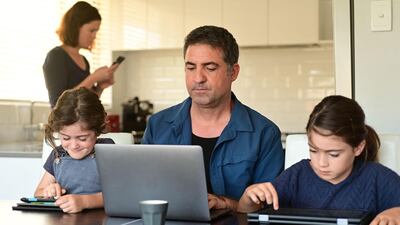Many people have been stuck in close proximity to those they live with for a couple of months now, amid the coronavirus pandemic.
With no clear end to social distancing in sight, even tiny habits might be starting to annoy you.
It’s easy to fall out with loved ones, even if we do cherish them.
Some of the biggest pitfalls are "not enough inner space, privacy and alone time, coupled with inadequate boundaries," Helen Williams, founder of Mindful Me, explains.
“Many of us simply may not realise how often we relax, rejuvenate and repair ourselves by using time apart for self-reflection, contemplation and integration.”
So, The National reached out to a range of relationship experts to find out what habits to adopt in order to live more harmoniously with others during these challenging times.
1. Write down what you appreciate
American self-help book author Rachael Lynn, who specialises in writing about personal relationships, advises penning three to five things per day that you appreciate about the person you’re living with. “Even if it’s just their hair,” she says. “You will relax a little bit and remember they’re not all bad, which will impact how you feel around them.”
Dr Sarah Rasmi, psychologist and managing director of Thrive Wellbeing Centre, says you can also do this out loud to each other. "Set aside a few minutes each day to identify one characteristic you love about your partner and an example of how he or she has exhibited it recently. Then, let your partner do the same for you. This tip can build positivity in our relationship."
2. Create boundaries during working hours
Mimi Nicklin, an entrepreneur who’s passionate about empathetic leadership, says establishing your own routine in your own physical space is key. “If you have a small area to work with, agree to rotate the space available from which you can work throughout the day, so you both move through the areas of the home. If possible, close doors between you to create some physical ‘absence’ for slots throughout the day, so you design the feeling of privacy.”
Williams agrees. “Routines and structure create safety and security, so scheduling regular time apart even within the same home can bring greater harmony and ease for everyone, even if only for short periods.”
3. Remember that we can all be at fault
When we’re upset with someone, try adding “just like me” to the end of your sentence, says Dr Saliha Afridi, a clinical psychologist and managing director at The LightHouse Arabia. “For example, ‘you’re being annoying, just like me’ or ‘you can be so selfish sometimes, just like me’. By doing this, you remind yourself that you are both human and no one is perfect.”
Your partner or the person you live with gets the added benefit of your empathy, too.
4. Express gratitude
Perhaps you think your thanks go without saying, but they don't. Saying "thank you" can actually be very powerful, says Rasmi. "Appreciating your partner and feeling appreciated is a great way to increase positivity in our relationship, which can also serve as a buffer to our negative encounters. Be specific and share with your partner how their action has impacted you emotionally. This will leave them feeling valued and ultimately increase the positive behaviour. It will also help them understand what is important to you and why."
5. Give yourself a second take
This works both ways, says Lynn. “When you say something you might regret or that hurts them, say, ‘Wait, erase that, what I meant was …’ and explain more softly.” When they’ve said something that’s upset you, ask them if they would like the chance to explain again before you respond, she says.
6. Make time to cherish each other
Days might seem to blur into one, but you should still make time to do something nice for your spouse, says Nicklin. “Consider organising a specially planned ‘date’ night at home by going the extra mile and cooking for each other and even changing the decor of the table,” she suggests. “Consider a themed date, which gives you an excuse to change up your regular food and even don a new outfit. The options for Mexican, Italian or Thai night could be endless.”
Williams extends this idea to the whole family. “Creating regular periods where each family member receives some special one-on-one time is valuable and necessary, and may produce some quite creative ideas and new discoveries,” she says.
7. But also have some alone time
“We all have a deep, inbuilt need for self-reflection, solitude and inner processing of thoughts and emotions,” explains Williams. “So being in close, continual proximity for extended periods can mean that time usually spent working through difficulties or confusion may build up and eventually explode on to the other.”
Recognising the need for a time-out, for space to mind your own business, is important, she says. “Offering this and requesting this is healthy and creates greater possibilities for emotional connection.” She suggests adopting a daily meditation practice, time for journaling, exercise, listening to music or reading.
Afridi calls this "inner hour". "Put on noise-cancelling headsets and watch a movie or meditate in your corner of the apartment and shut out the world. Every relationship needs both space and togetherness. And don't try to talk through an argument when you are both heated. Instead, have your 'inner hour' and then connect."
8. Have a laugh
It might seem simple, but "laugh together", says Rasmi. "Humour is a great way to have fun and connect. It can also be used to diffuse difficult situations – when it is tactfully applied!"
9. Recalibrate people’s expectations
Afridi says to be wary of people who believe that only those there for them during this time are true friends. “This is absolutely ridiculous,” she says. So if you feel you're not getting enough attention from loved ones? “Remind yourself that everyone has their own battle and is struggling with this new reality. Have mercy on yourself and others and adjust your expectations accordingly.”

10. Bust out the baby photos
When you’re feeling particularly irritated, it might help to look at a photo of the other person when they were younger, Lynn suggests. “You can almost never stay so angry when looking at a baby or young child version of someone you care about,” she says. “We’re all sometimes little kids inside, just trying to be happy and safe.”
11. Take up a hobby together
Find new and creative ways to have fun together, suggests Williams. “Taking up joint or family hobbies and simply spending quality short periods of time together focusing on a new or old activity, without screen time, can be rejuvenating and expansive.” This could be anything from taking up gardening to doing a jigsaw puzzle and even learning a new language together.
12. Read their body language
Be cognisant of your partner’s body language, says Nicklin. “Adapt proactively if you notice defensive changes to their stance.” This means watching for arms crossing, physically leaning back and faster breathing, which are all signs that the person could be feeling detached or stressed.
“If you do notice a change or noticeable stress, proactively try to offer new energy into the room by bringing the outside world in and suggesting a virtual workout, yoga class or webinar,” she suggests.
“Or perhaps simply consider giving them some time out alone by heading into another room with the positivity of a shared meal or tea together later on.”
13. Be the first one to give in
“It’s not easy,” Lynn admits, “but sometimes jokes that seem cruel or snide remarks are really just a way of us asking for connection – but we’re too hurt to be honest.”
When you hear one? Rise above it, she advises. “Say: ‘You know what? It’s OK – I love you.’”
14. Fill your cup first
Or, in other words, take care of yourself before others, says Afridi. “Everyone make a commitment to do what they need to do to take care of themselves, so they are not heavily relying on the other person to care of them.”
15. Let children take charge
Whether you have a toddler or a teenager, chances are, they’re getting restless staying at home, so it’s important you give them the attention they need, but also time to themselves. Williams explains: “Children thrive on periods of time when they can be in charge of their own thoughts, preferences and choices without interference.”
16. Tiny gestures have big returns
It’s those small acts of kindness that are going to make all the difference, says Afridi. “Make them a cup of tea, order their favourite takeout, pick up flowers at the grocery store. These small gestures are deposits you make into the other’s emotional bank account and then, when it comes time for withdrawal, you are not bankrupt.”
17. Consider this as a time of growth
This is proving to be a valuable time for people to face their relationship woes, says Williams. “Setting aside time each day to listen and learn about each other’s struggles rather than ignoring them has become a whole new relationship builder for many,” she adds.
“For those who normally build defensive inner walls, having the opportunity to learn how to lean in towards the other produces huge opportunities for personal growth, while those who pursue, grasp and clutch at the other can recognise how to step back and learn how to live in this newly created space.”





